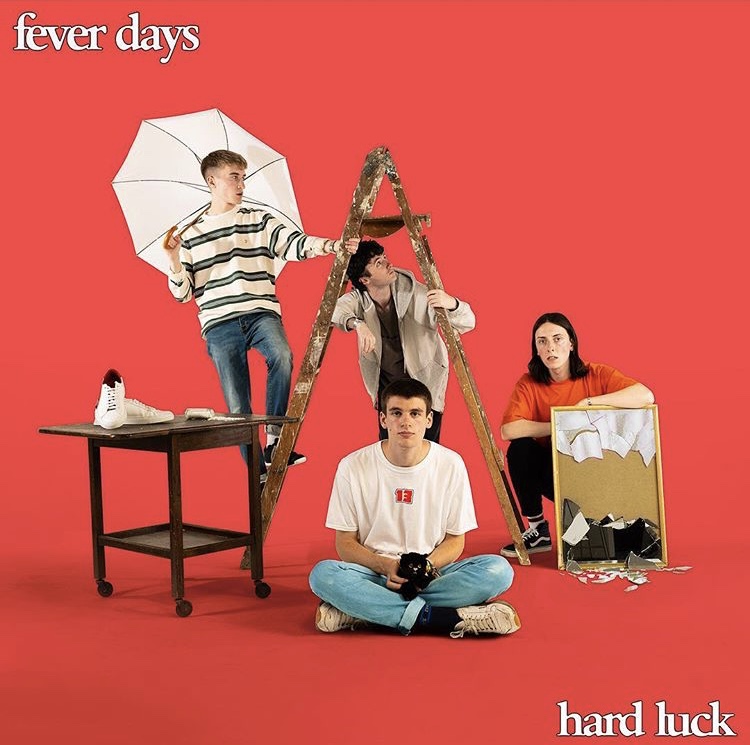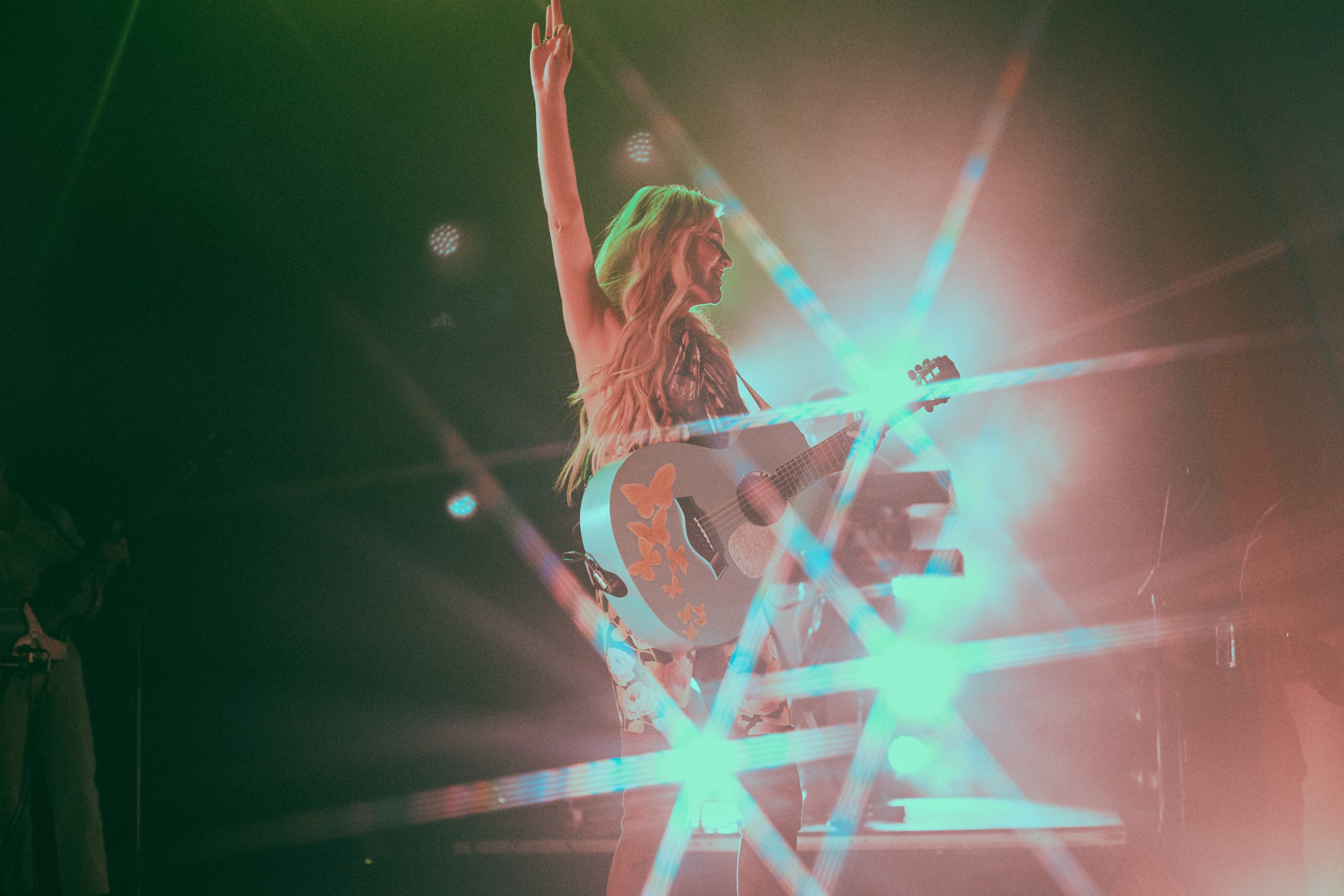Fever Days are leading the new wave of New Wave, and honestly, we’ve caught their fever!
How’s things, what have you been up to?
Ollie: Things are pretty good, we’ve just been on tour with The Pale White, which was mint, probably the best thing we’ve ever done, well, the best thing that I’ve ever done anyway; so that was really good. We’ve just played with Lauren Hibbard a couple of weeks ago and we did Twisterella festival in Middlesbrough. Then we’ve got a couple more support slots coming up next week, I think. Then a headline show in December.
Davey: New song out this Friday as well.
With the tour with The Pale White, how did that come about? And as experiences for you all, how did that develop you as a band?
D: How it came about was basically, they became aware of us just as we got involved with Kaleidoscope, like we practiced here. We’d met them before and chatted with them, being like please listen to us, and they liked it and stuff so that’s good.
O: It’s had a good impact I think, when you go there and play like 6 gigs in 7 days or 8 days or whatever, which is like more than we’d ever done and it’s just like you get used to loading in, setting up quickly, loading out and you just get better at playing live, just naturally I think, you know like practice makes perfect.
D: When you see someone, like a band like them, do what they do, it really teaches you quite a lot because they’re so professional and they really know what they’re doing.
Any tricks of the trade you picked up?
D: Just how to act professional you know what I mean. I think that’s really tough to get you know. You kind of learn that and people always say that you learn stuff like that when you’re touring from bands that know what they’re doing. I think we have kind of.
Jack: It’s really interesting to see behind the scenes as well and all the work that goes into it and how it all comes together.
It’s not all just getting pissed every night, well it kind of was but there is a lot of work that people don’t know about.
And they looked after you, that’s the main thing.
O: Yeah really well, like we shared the van with them and stayed in a house with them for like 5 days which was really good. They were just really really nice to us, so very thankful for that.
You mentioned supporting Lauren Hibbard, obviously in and around Newcastle you’ve done quite a few support slots, and Hit The North festival twice, is there anything you can pick as a stand out gig?
D: The Shields gig.
O: Yeah, I think the Shields gig, our first single launch at the Star and Shadow, that was really good.
D: Kind of like a turning point, I think. Actually, even Spring King which was like the month before that, it was the first gig we did when we were like I think this is it, we’re a better band now. Because the gigs we did prior to that we were just kind of finding our feet and the songs were like ones that Ollie had written a year before the band even became a thing, so we didn’t really know what we were. Spring King was like a good batch of songs and people reacted to it really well. That was a turning point for me.
O: The Lauren Hibbard one was one of my favourites just because it was the first one we did after we’d been on tour and so people knew who we were in the local scene. So, I think coming back and doing that, and it was a really good crowd as well. That was really good we had loads of people coming up to us after.
J: The gigs where you see the audience are enjoying themselves always tend to be the best, I think.
That’s a good answer Jack.
D: Hahaha. The ones where they hate it are the best, I love those gigs.
In terms of the Shields gig, they’re part of your label Kaleidoscope, as a label, how have they helped you springboard yourselves onto tours like with The Pale White?
O: I mean it’s been really good, Kaleidoscope even since we joined has like got a much bigger reputation now since it was a year and a half ago when we sort of joined it, but it’s been good, you just make links to these things like now we know Cole, who is The Pale White’s tour manager, we know the guys from Shields, who are really good musicians and happy to help us out with anything. Sort of through here we’ve got links with people like SSD and stuff like that, who offer us gigs. So, I think just being a part of it has definitely helped in giving us a boost that we wouldn’t have been able to do by ourselves.
And you’ve announced your first headline show, are you excited to have people coming down specifically to see you?
O: I think it’s going to be interesting because it’s the first time we’ve sort of put ourselves out there.
D: A lot of pressure but you know, exciting pressure.
O: I think we always wanted to wait a while before we did it because we wanted to build up a bit of hype or whatever, and now I think is the right time. It’s going to be really good and we’re going to put a lot of effort into not just the music but the production as well. The visuals and stuff like that.
D: The way we present ourselves is just as important I think, especially now because you’ve got a lot to compete with. There is a lot of live bands, so you need to do something that people go “oh they really stand out from every other live band in the scene.”
With your singles, there is a particular niche to your visuals, so what are you going to do at the show?
J: We can’t give tooo much away.
O: Like colourful stuff, obviously that’s been the theme, like having each release as a different colour, so we definitely want to follow that. But I think it’s more than just you know, rather than being a band that turn up, play your songs and you go, you have to have something that will stick with people.
Is it a collective decision or is there one creative drive for the imagery?
J: Ollie designs most of the imagery and everything you see on social media as well. I think we’re all happy with the direction it goes in, it’s almost like it doesn’t need to be said, it’s like it couldn’t really go any other direction than the way it has.
The images are very complex and stand out, you obviously rehearse a lot and play a lot of shows, so I was wondering how you balance your time between the band and university or work?
O: We don’t really, this is what I spend all my time on.
D: All of us just want to be musicians, so if something comes like a gig or we need to practice, it’s like I don’t care about anything else, it’s just music, we live and breathe it man. Haha.
J: We’re just waiting for the Academic year to finish so we can focus on it full time.
So, let’s talk about the singles, obviously ‘Hard Luck’ came out 3 weeks ago, tell me about the song and why that was the release you chose?
O: Well it’s about just sort of, it’s pretty self-explanatory really, I just felt like my luck was really poor. I just kept having bad things, not like really bad, but I just kept having these things happen to me, just having terrible luck. I wrote it about a year and a half a go now, but I still think in general I’ve always felt like quite an unlucky person I don’t know why. Things don’t really go my way a lot of the time, so that’s where that came from. What made it the release was that I felt like it was quite a good place to go after ‘I See Through It’, cos no one really expected it and we didn’t want to throw everyone off again. I think it was a good way to transition because it’s pretty poppy, but it’s got more guitar elements to it.
‘Drugs’ is your latest release, and you’ve been playing that song for a while now, do you think it’s important to hone the skills of a song live before you release it?
D: Yeah, I think because when you perform it live that’s when your sort of get to know the song, so that when you go into the studio, you’re already familiar with it. On the other hand, when you get into the studio you add more than you thought you would to the song, so you realise there’s more to do. All the songs we recorded were all performed live before.
J: It’s always been a cycle, we’ll learn the song, then play it live, then we’ll record it, then we’ll need to relearn how to play it with all the new bits and pieces we’ve added.
There’s a lot of synths and things in your songs, do you find it hard to get the production on your released stuff into a live performance?
D: I think it’s difficult because I’m playing drums and triggering synth samples at the same time which is quite hard. Ollie has to sing and trigger synths and play keys, it’s quite a task but it makes it more enjoyable, I think.
O: I mean there is a lot for us to do now, it’s not just like straight playing guitar and singing, but I think it’s worth it because we have a lot of comments from gigs and stuff with people being like ‘oh wow you have lots going on’. I think people take away from it more when there’s more going on. Not too much so it’s overwhelming.
J: People can always tell when it’s a backing track rather than when it’s triggered on stage in the moment.
I think the whole streaming numbers thing, especially for me, it gets in my head a lot. It makes me lose confidence sometimes when I’m like oh no this one hasn’t been streamed as much as this one sort of thing.
Your first release made it on to lots of playlists on Spotify and your listening figures were quite high for a band who had only been playing shows for six months at that point. When you saw the figures come in, what did you think? Did you expect such a reaction?
D: I remember the morning I woke up and Ollie had sent a photo to the group chat of the Spotify for artists thing, where you can track all your plays and everything, we had like 2,000 monthly listeners like overnight, I was like what the hell man.
O: It was great at the time but I sort of don’t like it in a way because now I feel like with every release there’s this pressure to get on playlists and if it doesn’t then it’s so disappointing.
D: There is like a bar set.
Already a bar set with the first release.
O: Yeah exactly. Obviously, it was a really good start, but since then we’ve had tunes that haven’t got on playlists and it knocks your confidence a bit.
J: I think what we are starting to realise though is that it doesn’t matter as much how well the songs perform, obviously you want them to do well but it’s more about conquering Newcastle first.
And what would you say is the weirdest place you’ve seen someone listening to your music?
O: Well, we got a tweet literally yesterday, this bloke tweeted us saying just heard your song in, you know the shop UNI QLO.
J: It’s like a Japanese clothing brand.
O: Yeah, in New York.
No way!
D: And he shazamed it.
Which song?
J: I See Through It.
WOW.
D: And I googled UNI QLO because I thought oh I bet it’s this tiny vintage shop.
O: Nah it’s massive.
D: Yeah it’s like this huge chain.
J: It’s like a massive sponsor of stuff.
O: They don’t have one in Newcastle though.
Finally, 2020, what’s next?
O: After the headline, you know we want that to give us a boost in the local scene and then I guess it’s just getting back into the studio and recording stuff. Possibly an EP in 2020 but to be honest we don’t really know at the moment. Nothing is set in stone. Then hopefully more tours.
D: And a bigger headline in Newcastle.
Some festivals maybe?
O: We’ll just see.
D: It would be good to get the kind of emerging, the festivals that put on emerging artists like Kendall Calling or Great Escape. That would be good.
O: Or even This Is Tomorrow in Newcastle.
D: Hit The North as well.
O: It just depends if we get the offers.


